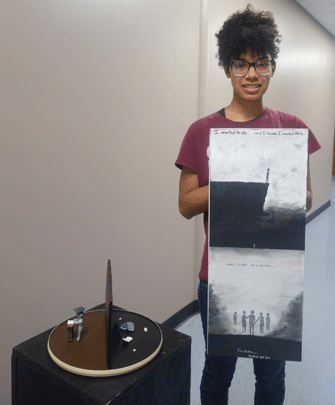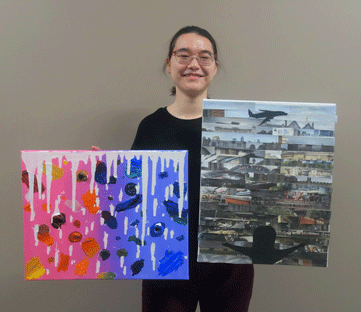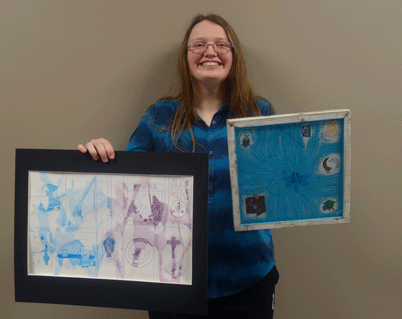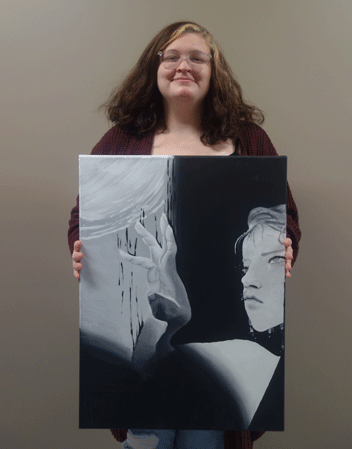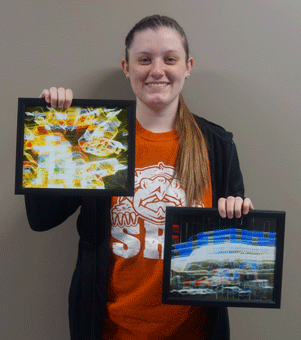Five Spoon River College art students who were awarded Performing Art Scholarships from the SRC Foundation recently had their final art pieces showcased in the Engle Hall display case. The students are Elizabeth Adami, Melody Barnes, Destiny Evans, Sydney Munson, and Keeara Virag.
Their assignment was tied to this year’s College Theme, “Who Can? We Can! The Will to Overcome,” and the students were tasked with creating two separate pieces that represented or portrayed the idea of overcoming a personal challenge, using any medium they wished.
“Each of them creatively tied their subject matter, choice of color and mediums, and compositional layouts to reinforce this concept of emerging on the opposite side of a challenge,” said Jamie Kotewa, SRC art teacher. “Each chose what challenge to respond to; some were very specific to a situation and others more broad.”
The challenges the students shared—family conflicts, pandemic lockdown frustration, adjustment to college life, loss, suicidal thoughts, identity acceptance and more—reflect challenges that affect many, and one of Destiny Evans’ goals was to let others know that they were not alone.
“Many students deal with a lot of emotions and over-thinking that can lead to suicidal thoughts. It’s an important topic I want people to talk about more and to understand you’re not truly alone,” wrote Destiny Evans in her artist’s statement. Her painting and a 3-D piece depicted both her personal struggles and her triumph over those struggles.
Melody Barnes wrote that her artwork “represents the conflicting emotions of wanting to reach for our goals and aspirations but how we hesitate because we are so scared of failure. It’s an internal fight between our heart and our mind.”
On one of her pieces, Keeara Virag used a wolf and a deer to represent the loss of a friend and a dragonfly as a symbol of how she has learned and changed from that experience. She also touched upon family dynamics, writing “This art piece helps to represent me by keeping balance on both sides of my family. I am the mediator of my family.”
Elizabeth Adami used the colors of pink and purple to represent being a twin. “As elementary students, my sister and I had different colors for the teachers and the classmates to tell us apart. Mine was pink, and my twin sister’s was purple. People still got us confused though.” Her travel abstract communicated her internal struggle of being “an introverted and anxious homebody” who loves to travel, as well as the experience of traveling alone in another country and not knowing the language.
Sydney Munson wrote “During the pandemic, many people, including myself, began to feel upset and frustrated that we could not enjoy the things we took for granted before the virus.” She used photographs of two of the things she missed most—theme parks and movie theatres—and expressed that by “cutting each photo into strips of color and black/white to represent the ups and downs of the last year.”
Kotewa said that the students developed the works over the semester and working on their own time. “These artworks help to show the depth of the student experience, particularly in relationship to the past two years.”
Spoon River College offers an AA/AS degree with a concentration in art for students planning to transfer to a four-year institution in a variety of degree programs, including advertising, architecture, interior design, and museum studies.
Performing skill scholarships are awarded each year through the SRC Foundation to students showing special ability or talent in the areas of Art, Drama, Athletics, Agriculture, and Speech and Debate.
For more information about the Art program, or the requirements for these and other SRC Foundation scholarship opportunities, visit www.src.edu, or call 309-647-4645 Five Spoon River College art students who were awarded Performing Art Scholarships from the SRC Foundation recently had their final art pieces showcased in the Engle Hall display case. The students are Elizabeth Adami, Melody Barnes, Destiny Evans, Sydney Munson, and Keeara Virag.
Their assignment was tied to this year’s College Theme, “Who Can? We Can! The Will to Overcome,” and the students were tasked with creating two separate pieces that represented or portrayed the idea of overcoming a personal challenge, using any medium they wished.
“Each of them creatively tied their subject matter, choice of color and mediums, and compositional layouts to reinforce this concept of emerging on the opposite side of a challenge,” said Jamie Kotewa, SRC art teacher. “Each chose what challenge to respond to; some were very specific to a situation and others more broad.”
The challenges the students shared—family conflicts, pandemic lockdown frustration, adjustment to college life, loss, suicidal thoughts, identity acceptance and more—reflect challenges that affect many, and one of Destiny Evans’ goals was to let others know that they were not alone.
“Many students deal with a lot of emotions and over-thinking that can lead to suicidal thoughts. It’s an important topic I want people to talk about more and to understand you’re not truly alone,” wrote Destiny Evans in her artist’s statement. Her painting and a 3-D piece depicted both her personal struggles and her triumph over those struggles.
Melody Barnes wrote that her artwork “represents the conflicting emotions of wanting to reach for our goals and aspirations but how we hesitate because we are so scared of failure. It’s an internal fight between our heart and our mind.”
On one of her pieces, Keeara Virag used a wolf and a deer to represent the loss of a friend and a dragonfly as a symbol of how she has learned and changed from that experience. She also touched upon family dynamics, writing “This art piece helps to represent me by keeping balance on both sides of my family. I am the mediator of my family.”
Elizabeth Adami used the colors of pink and purple to represent being a twin. “As elementary students, my sister and I had different colors for the teachers and the classmates to tell us apart. Mine was pink, and my twin sister’s was purple. People still got us confused though.” Her travel abstract communicated her internal struggle of being “an introverted and anxious homebody” who loves to travel, as well as the experience of traveling alone in another country and not knowing the language.
Sydney Munson wrote “During the pandemic, many people, including myself, began to feel upset and frustrated that we could not enjoy the things we took for granted before the virus.” She used photographs of two of the things she missed most—theme parks and movie theatres—and expressed that by “cutting each photo into strips of color and black/white to represent the ups and downs of the last year.”
Kotewa said that the students developed the works over the semester and working on their own time. “These artworks help to show the depth of the student experience, particularly in relationship to the past two years.”
Spoon River College offers an AA/AS degree with a concentration in art for students planning to transfer to a four-year institution in a variety of degree programs, including advertising, architecture, interior design, and museum studies.
Performing skill scholarships are awarded each year through the SRC Foundation to students showing special ability or talent in the areas of Art, Drama, Athletics, Agriculture, and Speech and Debate.
For more information about the Art program, or the requirements for these and other SRC Foundation scholarship opportunities, visit www.src.edu, or call 309-647-4645.
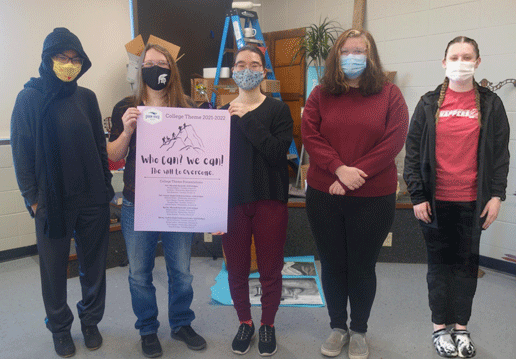
Destiny Evans, Keeara Virag, Elizabeth Adami, Melody Barnes, Sydney Munson

